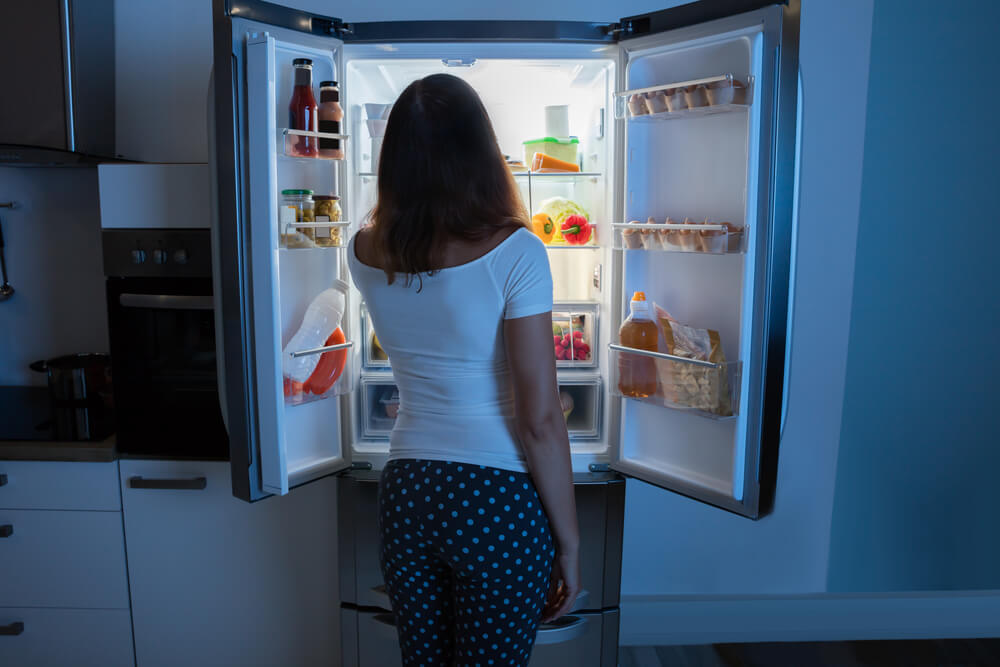How to Stop Stress Eating at Night

Whether it’s a habit you’ve had constantly for years or one you’ve picked up in light of recent events, stress eating at night can take a real toll on both your emotional and physical health. So, if you’ve found yourself eating more than usual and want to understand why and how you can prevent it, you’re in the right place. Read on a discover what may be the cause and how you can get back to a healthy diet by implementing these simple steps…
Why Do I Stress Eat?
To break the habit of stress eating, it’s best to first understand why exactly it’s happening in the first place. After all, if we don’t know the cause of the problem, we can’t hope to fix it.
The truth is, the route cause of stress eating usually differs greatly from person to person. Some will experience work-related issues whilst others may be struggling financially, for example. For many of us, being stuck inside, experiencing uncertainty over when and where we’ll be able to see our loved ones again safely, has brought on much greater levels of stress than we’d usually experience.
Therefore, we recommend starting with a little self-evaluation. It may be blindingly obvious to you what’s causing you to overeat right now. Or, you may need to do a little more digging and assess each area of your life before the cause becomes clear. Whichever is true for you, once you understand the most likely reason behind your anxiety, you’ll be able to work on eliminating or, at least, improving it.
Why Does It Happen So Often At Night Time?
Many of us who stress eat will find it often becomes even more of a problem during the evenings and late at night. This can be the result of many factors so finding the one that makes the most sense to you can be very beneficial.
So, what are some of the most common causes?
We’re glad you asked!
Maybe you’re trying to control your weight. Perhaps the stress of your day means you don’t make time to eat at all. Or, maybe you are consuming the correct amount of calories for your body but you’re getting them from the wrong foods.
After all, chips and chocolate sound particularly appealing when we’re feeling stressed out and low.
Unfortunately, all of these food restricting practices are a sure-fire way to bring on both evening hunger and the temptation to stress eat. For example, if you feel like you’ve barely eaten because all you’ve consumed all day is sugary and salty snacks, eating more to fill up when you’re stressed in the evenings will send you way over your healthy intake.
Likewise, you may have totally restricted yourself in the hope of losing weight. Or, perhaps you simply haven’t made the time due to a particularly stressful time in your life.
As a result, you’ll often end up giving in and eating a day’s worth of food at night time. Usually, because the distractions and willpower of the day have subsided or because we get too hungry to go on. This gives our food no time to burn off before we lay down to sleep, plus, it can easily lead to sleepless nights, indigestion, and more.
How Can You Help Yourself?
Identifying the cause of your nighttime snacking habit will be a huge help on the road to a healthier lifestyle.
Take some time to assess your life right now. Try to understand the parts of your day that may be causing you distress or unhappiness. Then, work towards mending those areas or, where possible, eliminating them. Once you’re less stressed, it’s much easier to focus on creating and maintaining a healthy relationship with your food.
How can this be done?
Read on for our top tips!
Keep A Food Diary
Over the years, we’ve found that the best way to keep track of anything, including the food that we’re consuming, is to write it down. Not only can we track our progress much easier this way, but we can also start to understand the behaviors and common occurrences that cause us to overeat, especially at night time.
For example, when your day is so busy that you couldn’t possibly recall what you’ve eaten, reaching for your third packet of chips or another couple of cookies doesn’t seem like such a big deal. You’ve had a hard day and the comfort of eating makes you feel momentarily happy so it’s worth it, right?
Well, if you’re nodding along just now realizing you do this or you’ve known for quite some time that you do, this tip is essential for you. Make a food diary!
You may think you’ve made your usual breakfast lunch and dinner with a couple of snacks thrown in here and here, but it’s so often more than we think. When you actually start to record your intake, it can be surprising what you find. Having your whole days worth of food laid out before you can really help you to sensibly question whether you’re actually hungry for a midnight snack, or if you’re simply craving it through stress or boredom.
Of course, tracking every meal and snack can become time-consuming when you’re super busy. Taking time out to calculate every calorie and gram of salt or sugar just isn’t practical for many of us. Luckily, that needn’t mean you can’t do it!
Get yourself an app such as My Fitness Pal and let it do the hard work for you. You can even scan in barcodes from packets to instantly retrieve their nutritional stats. Plus you can create and record meals you eat often to quickly calculate your healthy daily intakes!
Make A Plan
Much like a food diary, making a plan for your meals and snacks each week is a great way to record exactly what you’re consuming. In turn, understanding the way you eat will help you more easily amend your habits and prevent midnight stress snacking!
So, before the start of each new week, make yourself a plan for the meals you’ll eat each day, plus the snacks to go with them! It can take a couple of tries and a little getting used to but once you have, it’s a real time saver!
Once you have it down, grocery shopping will be much easier too! It’ll also allow you to ensure your week is full of good food rather than just grabbing whatever’s on hand. Thiscan frequently lead to unnecessary hunger and over-eating at the end of your day.
Finally, by knowing what food is coming, and when, you’re much more likely to look forward to and appreciate what you’re eating. Also, when we know our planned meals are designed to fill us up in a healthy way, it’s much easier to go without unhealthy snacks in anticipation of your next meal.
Get Good Quality Sleep
There’s always a lot of argument over how many hours of sleep we need. Some say 8 hours is paramount whilst others are sure that 7 hours is the perfect amount. Meanwhile, some studies claim that just 5 hours is enough to re-energize us for the day ahead.
Now, though there may be no definitive answer on the exact number of minutes rest we each need, one thing’s for sure. Ensuring that the time you do spend asleep is uninterrupted and of good quality is essential.
For example, 8 hours in bed sounds like a dream. But, if you’re constantly tossing and turning or waking up every few minutes during that time, you’ll certainly notice come the morning.
So, in terms of our diets and overeating through stress, why is the quality of our sleep so important? The answer is, most of us will discover that having good quality sleep for a shorter amount of time versus lots of hours of disturbed sleep, results in us feeling more rested.
When we’re well-rested, dealing with everyday stresses such as work or money problems, for example, is that much easier to deal with. Your mind is focused and able to concentrate. Therefore you’re much more able to rationalize and plan out your solutions rather than feeling overcome and anxious.
This clear-headed way of thinking will help you take steps forward in addressing the problems that are causing you to stress eat.
Give Yourself Time
When that 12 am craving hits, don’t give in to it right away. We know this is easier said than done but simply waiting it out for 20 minutes can be the difference between eating it and not eating it.
Why?
It’s quite simple really!
This 20 minute period works for two reasons. Firstly, it gives you time to consider if you really need/want a snack. Are you actually hungry, or are you simply craving it through habit?
Secondly, it gives you the chance to forget about it. Cravings are impulsive. We think of what we want, we get the excitement to eat it, we do, and then it’s over. Chances are if you make yourself wait for 20 minutes the excitement and anticipation of your craving will pass and you’ll realize you don’t need/want it anyway!
Learn A New Skill
Preventing night-time stress eating goes hand in hand with making sure you’re full up from all of the right foods. Though it’s true we often don’t even need to be hungry to crave something, being satisfied with your evening meal will certainly help to dull your want for something extra.
Therefore, we need to make sure we’re filling up on the right foods. This can be a great excuse to read up on nutritious eating and to learn more about what your body needs. It’s also the perfect chance to brush up on your cooking skills and to make cooking your evening meal a pleasurable activity.
Trust us, doing it this way will not only be educational, but there’s also something about putting time, effort, and love into something that makes it feel all the more special and satisfying. After spending an hour or two creating a balanced and nutritious meal that looks, tastes, and feels great to eat, reaching for that processed candy bar won’t feel half as satisfying as it once did.
Don’t have time to prep loads of healthy ingredients?
No problem!
A meal service like Hello Fresh will deliver healthy, pre-prepared ingredients and easy to follow recipe cards to your front door!
Find Healthy Substitutes
If you’re a natural-born snacker, chances are, you’re going to eat more when tensions are high. If you feel this is inevitable at certain periods of your life, that’s no problem. You simply need to be realistic and make sure there are healthy alternatives available to you both at home and at work.
A few extra pieces of fruit, a natural yogurt, or a delicious smoothie in the evenings is a much better and healthier choice than candy bars and chips will be. After all, we’re often just craving the action of eating rather than a specific food. Therefore, healthier alternatives such as these can satisfy your craving without significantly tipping the scales.
Hydrate
Is it hunger, or is it thirst? Surprisingly, it can often be hard for our bodies to differentiate, especially when we’re stressed! Sometimes, that craving for a snack often means you’re dehydrated. Make sure this doesn’t happen by staying adequately hydrated at all times.
When you’re super busy it can be hard to keep track of your water intake. Give yourself a helping hand with a water tracking bottle that lets you know how much water you need to have consumed by each hour of the day!
Be Kind To Yourself
When attempting to change any habit, it’s so important to remember that you are only human and you’re absolutely allowed to slip up every now and then. So, when things have been going well then you have an off day (or this case, an off night), let it go.
Is it annoying when you’ve been so good? Yes! Is it the end of the world? Absolutely not! Accept it, and move on. Making yourself feel bad and dwelling on it won’t change it, it’ll only add stress to a situation that’s much improved without it!
Move
Making sure to keep your body moving through regular exercise is absolutely vital when it comes to stopping late night stress-eating. Not only will it make you feel stronger and healthier, but it’ll also serve as a welcome, and hopefully enjoyable distraction.
Not to mention, all that moving around will inevitably make you sleepier come the evening. With any luck, this should lead to a peaceful night’s rest with no need for the distraction of food.
If you’re wondering which type of exercise is best, we recommend any activity that gets your heart rate up, that you truly enjoy, and will do consistently. If you hate running, forcing yourself to cover miles each day will likely end in you giving up after a week.
Find something you love to do and you’ll find it’s more of a treat than a chore!









